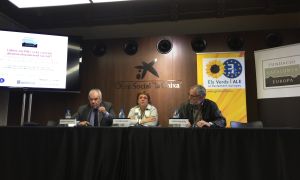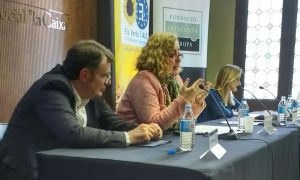"Catalonia is in position 52 [out of 272 European regions] with respect to GDP, but in social development we are in 162. Do we have to talk about it? I think so". Dolors Bassa, Minister of Labor, Social Affairs and Families of the Generalitat, believes that the Regional Index of Social Development can help reconcile economic development and social welfare. A conclusion shared by the speakers of the conference "Leaders in GDP and in the queue in social development The European regional index of social development under debate".
The Catalonia Europa Foundation (FCE) held the conference last Friday at the Palau Macaya in Barcelona with the support of the Greens / EFA Group in the European Parliament and the collaboration of the Department of Labor, Social Affairs and Families; the Josep Irla Foundation and the Obra Social La Caixa. The purpose of the event was to discuss the potential of the Index as a complement to GDP. "The SPI is the first index that does not include economic indicators but social and environmental indicators", explained Nicola Caputo, Member of the European Parliament of the S & D Group and one of the promoters, together with Ernest Maragall MEP (Greens / ALE), of the Index in the European Parliament. "GDP does not measure the value of nature, self-production or self-consumption, and [in the European Union] we are trying to favor these activities", recalled Jordi Angusto, member of the executive committee of the FCE. In fact, the improvement of GDP does not have to affect the population. "A good part of the profits [in recent years] have ended up in the hands of the top 1% of the population", added Angusto.
The European Social Development Regional Index (SPI) is part of the Social Progress Index, an indicator developed by the Social Progress Imperative, an international non-profit organization. The SPI is the result of a project of this entity with the General Directorate of Regional and Urban Policy of the European Commission; and Orkestra, Basque Institute of Competitiveness, a research center linked to the Deusto Foundation. The idea is to adapt the Index, worldwide in scope and designed to be applied in developing countries, to the situation in Europe.
Francesc Colomé, member of the Executive Committee of the FCE, explained that the Index "exclusively measured social and environmental factors", without economic indicators such as per capita income. At the same time, it focuses on the real situation of the population. How does the SPI work? This, explained Colomé, is divided into three groups of indicators: "basic human needs" such as access to housing and food, "welfare bases" such as early school leaving and "people's opportunities", with training throughout life an example.
The fact that it does not include economic data "allows for comparisons with GDP," added Colomé, who showed that "at higher levels of GDP the differences in the countries' SPI increase," due to the role of governance in the situation of the population. In fact, if there is a relationship between the increase in GDP and the part of the SPI "linked to basic human needs and the welfare bases", "there is not a good correlation with environmental sustainability indicators and health indicators, such as obesity, "he reflected. With these data, Colomé advanced that the intention of the Foundation "is to cross the data of the SPI with those of governance, to analyze the role of this in the social progress".
Such a complex Index also entails challenges. Susana Franco, researcher at Orkestra, explained that "official sources such as the Eurostat standard of living survey" were combined with "other unofficial sources, such as the Gallup survey", depending on the type of information sought. It must also be borne in mind that the data are not totally comparable, in some cases: "Indicators are not always available at the regional level, in some countries they are found at the national level".
The results, however, allow to illustrate notable differences. "With respect to regions with similar GDP per capita [such as Hannover in Germany or Limburg in the Netherlands], Catalonia is at a worse level of SPI," said the researcher at Orkestra. Without highlighting aspects such as "tolerance of homosexuals and respect for diversity", the country is in a worse situation in the three groups of indicators that make up the SPI. With this starting point, Susana Franco concluded that "the Index should serve to analyze the reason for the problems of social development".
Natalia Mas Guix, general director of economic analysis of the Department of the Vice-presidency and Economy and Finance, advanced some possible causes: One of them may be "the costs of [environmental] congestion in areas with large capital," such as Barcelona. "The financing system, which harms Catalonia, would be another". Meanwhile, "the capital favors Madrid, which welcomes government institutions, and helps to compensate for the congestion of a large city". And "the regional system can help" to Autonomous Communities such as the Basque Country and Navarre. All these communities, in fact, have an SPI Index higher than Catalan.
Francesc Iglesias, Secretary of Social Affairs and Families of the Department of Labor, Social Affairs and Families, added more reasons: "Catalonia is one of the countries where income inequality has increased most since 2009". If that year people in the top 20% of the population had incomes five times higher than those of 20% lower income, in 2014 the difference was six and a half times. And not so much because the rich are richer, but because "the middle class has been weakened, and poor people are now even poorer" because of the crisis.
Faced with this situation, Iglesias wanted to emphasize that much more can be done, "moving from a social spending approach to a social investment approach", which affects the work opportunities of the population and helps them escape from poverty. Policies must also contribute to changing the economic model, because it "does not favor social development". A point in which Colomé also affected during the question time: "In Catalonia we have one of the worst levels of school dropout [of the EU], this happens where the economy is of low added value".
The findings of the Index, then, suppose a before and after in the policy of Autonomous Communities. But also of the States. And of the European Union. On the one hand, Bassa pointed to the "fiscal deficit" as "one of the main problems". On the other, Maragall said that "the European Commission can not avoid the Regional Index" when designing regional policies such as cohesion funds. The GDP, after all, only serves in part.












